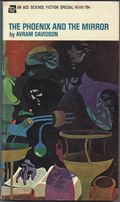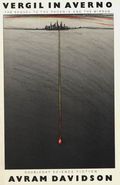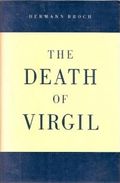Avram Davidson, in mid-career, wrote The Phoenix and the Mirror, a beautiful fantasy novel of a complicated, wheels-within-wheels task laid on his character Vergil Magus in the middle of his life.
There is a sense that Vergil, the hero of one of Davidson's largest projects that was never finished, was someone with whom he deeply identified – this was not exactly the Virgil of the Aeneid, but a complex intertextual/para-historical game of reviving the Middle Ages image of that Virgil as a master magician. So, strangely – but with incredible density, as Davidson collected and revised detailed materials for many years for a planned series of nine books – we have a linguistically and materially realistic portrait of this Vergil: a Vergilian world where the facts of everyday life, habits, religion, and government are derived from the height of Imperial Rome, but where there are also strange medieval inflections and interpolations that pass without comment.
 The Phoenix and the Mirror is complicated; there are dreamscapes and twists and turns in the plot, hints that occur almost in passing (Davidson being one who didn't think he needed to explain things to you, that you were paying attention and had a good memory and weren't thrown by arcane circumlocutions), and they all land in a strange but satisfying ending: we are reassured that this Vergil, wise, knowledgeable, kind but strong in purpose, has to use all his intellect to survive the tangled machinations of an age where many have intricate knowledge and power, and use them to devious or unpredictable ends.
The Phoenix and the Mirror is complicated; there are dreamscapes and twists and turns in the plot, hints that occur almost in passing (Davidson being one who didn't think he needed to explain things to you, that you were paying attention and had a good memory and weren't thrown by arcane circumlocutions), and they all land in a strange but satisfying ending: we are reassured that this Vergil, wise, knowledgeable, kind but strong in purpose, has to use all his intellect to survive the tangled machinations of an age where many have intricate knowledge and power, and use them to devious or unpredictable ends.
Davidson was so badly treated by publishers over the first book (although it is now respected, they wanted to pulp the first printing because it seemed impossible to sell) that he changed publishers for the second, which also had low sales despite being nominated for a major award. The third manuscript was left among boxes of papers – tons of papers, detailing notes for a vast array of scenes and activities – and only saw the light of day as a small-press hardback a few years ago; the other six books were simply never written. Clearly Davidson planned on different crises and episodes from this Vergil's life, and only completed the first on Vergil in middle age, the second on a young man on his first great adventure, and a third between those two; with some short stories that outline him as a boy and as an old man. Davidson also wasn't patient with publishers: when the smart thing would have been to ignore their reactions and push on, he was so infuriated by the ill-treatment of the first two books that the whole project gradually lost the impetus to complete it.
I read the first book as a teenager, and was utterly fascinated but confused; only now does it (mostly) make sense to me. I dug up the second (a library copy, not cheap) some years ago, and bought the third as soon as it was released in 2005.
 All of which is prelude to saying: when I first tried to read the second book, Vergil in Averno, I was impressed but utterly lost; I simply couldn't follow what was going on after thirty or forty pages. It reminded me of the first three chapters of Joyce's Ulysses – I've always been hugely proud that I read Ulysses as a high-school independent study, inspired by the kind and tough-minded Mary Hollingshead, who believed in me enough to hand me this difficult adult book and see what I could do with it. (I also remember how Steve Tucci, my friendly but mentally uncomplicated lab partner – co-captain of the football team – picked up Ulysses one day and said he'd heard it had dirty stuff in it. Whereupon he opened the book and tried to find some dirty stuff – and soon retired, utterly defeated by the style). Those first three chapters of Ulysses come before the book gets into the razzle-dazzle textual games of later, more playful chapters; the first three are thorny, difficult, intellectual, and not really fun – I'm still not sure how I got through them at all.
All of which is prelude to saying: when I first tried to read the second book, Vergil in Averno, I was impressed but utterly lost; I simply couldn't follow what was going on after thirty or forty pages. It reminded me of the first three chapters of Joyce's Ulysses – I've always been hugely proud that I read Ulysses as a high-school independent study, inspired by the kind and tough-minded Mary Hollingshead, who believed in me enough to hand me this difficult adult book and see what I could do with it. (I also remember how Steve Tucci, my friendly but mentally uncomplicated lab partner – co-captain of the football team – picked up Ulysses one day and said he'd heard it had dirty stuff in it. Whereupon he opened the book and tried to find some dirty stuff – and soon retired, utterly defeated by the style). Those first three chapters of Ulysses come before the book gets into the razzle-dazzle textual games of later, more playful chapters; the first three are thorny, difficult, intellectual, and not really fun – I'm still not sure how I got through them at all.
Vergil in Averno is similar, in some ways, at least at first: a dense, nightmarish landscape of a dirty, smoky 'Very Rich City' where Vergil has found himself, the language is intricate and elliptical, cultural and technical cross references fling themselves in all directions, and the atmosphere is dark and claustrophobic. Because this is very different than the tasks-within-tasks of the first book, or the Odyssean sea voyage of the third – this is intentionally about an evil city filled with evil people, which is experienced as a nightmare that cannot easily be escaped. Vergil has to work through the project he has been asked to complete – to come up with a plan to improve access to the ancient volcanic fires that give the city its grotesque character and major source of income; but he gets little help and much hindrance, especially from rich brutes who seem not only incapable of understanding sophisticated plans but are in fact capable of little but cheating him of his fee.
And it gets, intentionally, ugly – there is a disturbingly eerie passage as early as the third page where Vergil is taken to see the torture dungeons (as in another city you might be taken to see the municipal gardens), a sensually erotic vision of a handsome young man who at first seems pitiable as he is being tortured – and then Vergil realizes he is merely working hard as a torturer, naked and muscular and focused on pulling a system of chains that are causing agony to a fat old man. The disturbing inversion, Vergil's disorientation and confused repulsion, are a wonderful way of creating a sense of this city where power and money barely even pretend to do any positive good.
Given how impossible I found it a few years ago, I was surprised this time that I found the book so readable – yes, I needed to slow down and keep my balance in the denser sections, especially the pseudo-dream/pseudo-magical hallucinations that take over two-thirds of the way through the book. But I could follow it, and read it over three days, fascinated and appalled by the nasty traps that were set, as well as by the sense that this younger Vergil was still not in command of his powers or his own self – he is trying to focus, trying to understand, but has never faced anything this deadly or complicated.
(Perhaps I am more alert, perhaps more reading and writing and my Jungian commitments have brought me back to thinking or working harder – and in any case thinking and working hard seem more interesting to me these days than they did for most of the past decade or so; perhaps that's all it is. An inspiring possibility: that even at my age I can change, can wake up, and life can get more interesting rather than less – that I could learn to be more aware of things, rather than simply assuming that my limitations were set long years ago, and not subject to change.)
Reading the book was fascinating, and satisfying – even the realization that some characters would return in later parts of Vergil's life (you meet his large gruff foreman from Phoenix as a street urchin in Averno, and realize why years later they would trust each other utterly). And, if you look up Averno online (as I did), you get a hint of where the ending might be going – and that is indeed where it does go: the surprises of the first and third books are here replaced by the grim inevitability of a Greek tragedy, where what will happen is already hinted as early as the first page, but it is still fascinating to see the story get there.
A powerful experience, a powerful tonic, to believe again in books and stories and thinking and understanding: and to see what it can be, to become a magus....
•••
A later, Virgilian appendix: given that I've always found the Aeneid even less interesting than the Iliad – yes, both have beautiful passages that I've read out of context (most recently in amazing 'recomposed' excerpts of the Iliad by Christopher Logue), but they're both so much about packs of men, like wolves, in wartime, which interest me not at all – it's a bit weird that two favorite works of mine are about reconstructed Virgils. (I'm much more of an Odyssey/Ulysses person – the Odyssey is endlessly fascinating and exciting, partly because it's not just men hacking away at each other and then justifying it for pages on end.)
 One of these reconstructed Virgils is of course the Vergil Magus series, the other Hermann Broch's The Death of Virgil: also insanely dense, as much as the densest poetry, but written as endless and nearly paragraph-free prose across three hundred pages or so, it as amazingly beautiful and also very, very hard to remember or to follow (some years ago I made myself a task of reading ten pages a night in bed – beautiful writing but I was constantly forgetting what the point was, because the endless internal monologues, memories and dreams are so interwoven that you can't easily remember where the heck you are). Given how nearly easily I just read Vergil in Averno, perhaps I could take another stab at the Broch, however.
One of these reconstructed Virgils is of course the Vergil Magus series, the other Hermann Broch's The Death of Virgil: also insanely dense, as much as the densest poetry, but written as endless and nearly paragraph-free prose across three hundred pages or so, it as amazingly beautiful and also very, very hard to remember or to follow (some years ago I made myself a task of reading ten pages a night in bed – beautiful writing but I was constantly forgetting what the point was, because the endless internal monologues, memories and dreams are so interwoven that you can't easily remember where the heck you are). Given how nearly easily I just read Vergil in Averno, perhaps I could take another stab at the Broch, however.
Because, certainly, it can be worth it: some very complex literature (and other art) seems to lead upward to something more and more aware, deeper, well worth the extra effort. (That doesn't apply to everything difficult of course – intermittent combinations of modernist complexity and nihilistic deflation do result in some books that, ultimately, don't seem worth the energy. And no, I still can't deal with the tangled misspellings of Finnegans Wake – I hate 'unspelled' writing, can't get into it, any more than I can stand much microtonal modernist music – and don't plan on trying to do so; which is why Banks' Feersum Endjinn is also scratched off my long list.)
So it's a bit weird: these two rich images of Virgil, images I strongly respect and identify with – and yet I've never really had a shot at what he wrote. (Which would have to be in translation anyway – no matter how much it might be possible for me to, as it were, experience increasing rather than declining mental powers, there's no way I'm ever going to learn Latin at this point.)
A bit strange, I suppose: to look at many of the mirrors in this hall of Virgils, yet never to have seen the original....
Not so good: the usual – transportation (waiting half an hour for an underground train that never came because practically the entire line is cancelled on weekends – London is frantically, and rather late of course, trying to clean things up for the damned Olympics), crowds of tourists, the huge and incomprehensible directions in stations.